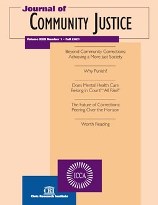Filling the Gaps in Restorative Justice Through Best Practice Inquiry Toward Culturally Competent Practice
Author: Jung Jin Choi, Ph.D., M.S.W..
Source: Volume 18, Number 01, Fall 2008 , pp.5-13(9)

< previous article |next article > |return to table of contents
Abstract:
Most victims face insensitive treatment in the criminal justice system and have little input into the resolution of their cases. Many victims reported that they did not see it as fair to punish their offenders through retributive justice with incarceration. In delivering an apology, offenders acknowledged the effect of the crime on the victims’ families and also recognized that the apology would not change what happened. Recidivism results were again mixed, and offenders in restorative justice programs were not less likely to reoffend than were their non-program counterparts. The factors that most affect satisfaction were related to mediator style and attitudes, fairness of the restitution agreement, and an opportunity to meet the offender. Taken together, the findings suggest that whether they were victims or offenders, people of color were less likely to participate in restorative justice programs.Keywords: Consumer Perspectives; Professional Perspectives; Empirical Research Perspectives
Affiliations:
1: Florida Atlantic University School of Social Work.